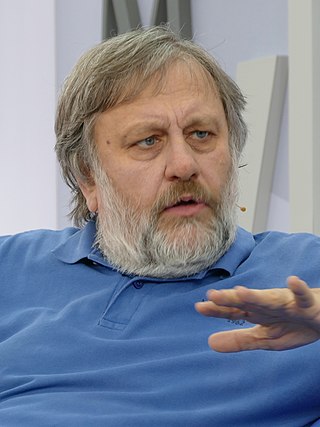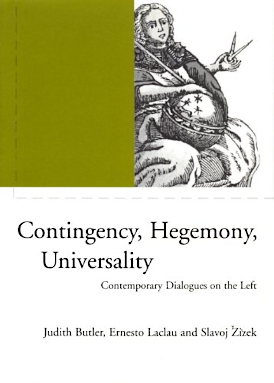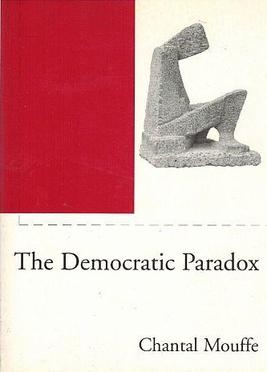The following outline is provided as an overview of and topical guide to critical theory:
Post-structuralism is a philosophical movement that questions the objectivity or stability of the various interpretive structures that are posited by structuralism and considers them to be constituted by broader systems of power. Although post-structuralists all present different critiques of structuralism, common themes among them include the rejection of the self-sufficiency of structuralism, as well as an interrogation of the binary oppositions that constitute its structures. Accordingly, post-structuralism discards the idea of interpreting media within pre-established, socially constructed structures.

Slavoj Žižek is a Slovenian philosopher, cultural theorist and public intellectual.

In Marxist philosophy, cultural hegemony is the dominance of a culturally diverse society by the ruling class who shape the culture of that society—the beliefs and explanations, perceptions, values, and mores—so that the worldview of the ruling class becomes the accepted cultural norm. As the universal dominant ideology, the ruling-class worldview misrepresents the social, political, and economic status quo as natural, inevitable, and perpetual social conditions that benefit every social class, rather than as artificial social constructs that benefit only the ruling class.

Ernesto Laclau was an Argentine political theorist and philosopher. He is often described as an 'inventor' of post-Marxist political theory. He is well known for his collaborations with his long-term partner, Chantal Mouffe.

Chantal Mouffe is a Belgian political theorist, formerly teaching at University of Westminster. She is best known for her and Ernesto Laclau's contribution to the development of the so-called Essex School of discourse analysis. She is a strong critic of deliberative democracy and advocates a conflict-oriented model of radical democracy.
Freudo-Marxism is a loose designation for philosophical perspectives informed by both the Marxist philosophy of Karl Marx and the psychoanalytic theory of Sigmund Freud. Its history within continental philosophy began in the 1920s and '30s and running since through critical theory, Lacanian psychoanalysis, and post-structuralism.
Agonism is a political and social theory that emphasizes the potentially positive aspects of certain forms of conflict. It accepts a permanent place for such conflict in the political sphere, but seeks to show how individuals might accept and channel this conflict positively. Agonists are especially concerned with debates about democracy, and the role that conflict plays in different conceptions of it. The agonistic tradition to democracy is often referred to as agonistic pluralism. A related political concept is that of countervailing power. Beyond the realm of the political, agonistic frameworks have similarly been utilized in broader cultural critiques of hegemony and domination, as well as in literary and science fiction.

Contingency, Hegemony, Universality: Contemporary Dialogues on the Left is a collaborative book by the political theorists Judith Butler, Ernesto Laclau, and Slavoj Žižek published in 2000.
Radical democracy is a type of democracy that advocates the radical extension of equality and liberty. Radical democracy is concerned with a radical extension of equality and freedom, following the idea that democracy is an unfinished, inclusive, continuous and reflexive process.
Alan Johnson is a British political theorist and activist. He is a senior research fellow at the Britain Israel Communications and Research Centre. Previously he was Professor of Democratic Theory and Practice at Edge Hill University.
Ljubljana school of psychoanalysis, also known as the Ljubljana Lacanian School, is a popular name for a school of thought centred on the Society for Theoretical Psychoanalysis based in Ljubljana, Slovenia. Philosophers related to School include Rastko Močnik, Slavoj Žižek, Mladen Dolar, Alenka Zupančič, Miran Božovič and Eva Bahovec. Other scholars associated with the school include philosophers Simon Hajdini, Zdravko Kobe, Rado Riha, Jelica Šumič Riha, sociologist Renata Salecl and philosopher Peter Klepec.
Marxism is a method of socioeconomic analysis that originates in the works of 19th century German philosophers Karl Marx and Friedrich Engels. Marxism analyzes and critiques the development of class society and especially of capitalism as well as the role of class struggles in systemic, economic, social and political change. It frames capitalism through a paradigm of exploitation and analyzes class relations and social conflict using a materialist interpretation of historical development – materialist in the sense that the politics and ideas of an epoch are determined by the way in which material production is carried on.
Post-politics in social sciences is a term used, along with similar terms "post-democracy" and post-political, to describe the effects of depoliticisation in the late 20th and early 21st centuries. Arguably, the representative democracies at this time had already entered the era of depoliticisation and post-politics. The term "post-politics" carries negative connotations of depriving electorate from voting on issues deemed settled by the elites, "depoliticisation" is neutral.
Yannis Stavrakakis is a Greek–British political theorist. A member of the Essex School of discourse analysis, he is mainly known for his explorations of the importance of psychoanalytic theory for contemporary political and cultural analysis and for his discourse studies on populism.
The Essex School of discourse analysis, or simply 'The Essex School', refers to a type of scholarship founded on the works of Ernesto Laclau and Chantal Mouffe. It focuses predominantly on the political discourses of late modernity utilising discourse analysis, as well as post-structuralist and psychoanalytic theory, such as may be found in the works of Lacan, Foucault, Barthes, and Derrida. Discourse analysis, according to its own terms at least, seeks to "unfix and destabilise" the accepted meanings of everyday language, and to reveal how the dominant discourse "marginalises and oppresses... equally valid claims to the question of how power could and should be exercised."

The Democratic Paradox is a collection of essays by the Belgian political theorist Chantal Mouffe, published in 2000 by Verso Books. The essays offer further discussion of the concept of radical democracy that Mouffe explored in Hegemony and Socialist Strategy, co-authored by Ernesto Laclau. In this collection, Mouffe deals with the specific conflicts between the post-Marxist democratic theory that she and Laclau theorized in Hegemony and Socialist Strategy and the competing democratic theories proposed by Jürgen Habermas and John Rawls. Verso's UK blog characterizes The Democratic Paradox as Mouffe's most accessible review of her perspectives on radical democracy.
Post-Marxism is a perspective in critical social theory which radically reinterprets Marxism, countering its association with economism, historical determinism, anti-humanism, and class reductionism, whilst remaining committed to the construction of socialism. Most notably, Post-Marxists are anti-essentialist, rejecting the primacy of class struggle, and instead focus on building radical democracy. Post-Marxism can be considered a synthesis of post-structuralist frameworks and neo-Marxist analysis, in response to the decline of the New Left after the protests of 1968. In a broader sense, post-Marxism can refer to Marxists or Marxian-adjacent theories which break with the old worker's movements and socialist states entirely, in a similar sense to post-Leftism, and accept that the era of mass revolution premised on the Fordist worker is potentially over.

Eurocommunism was a trend in the 1970s and 1980s within various Western European communist parties, which said they had developed a theory and practice of social transformation more relevant for Western Europe. During the Cold War, they sought to reject the influence of the Soviet Union and its communist party. The trend was especially prominent in Italy, Spain, and France.

Marxist cultural analysis is a form of cultural analysis and anti-capitalist cultural critique, which assumes the theory of cultural hegemony and from this specifically targets those aspects of culture which are profit driven and mass-produced under capitalism.








